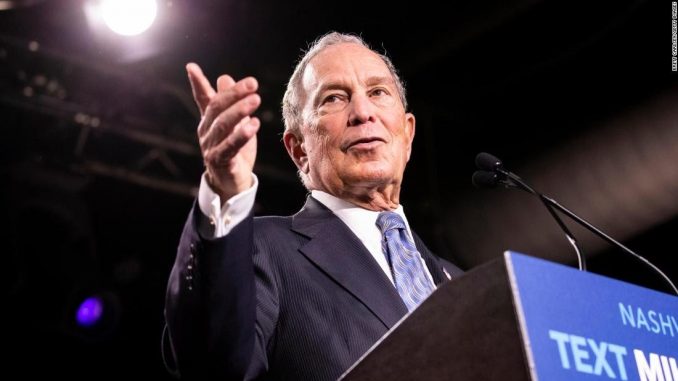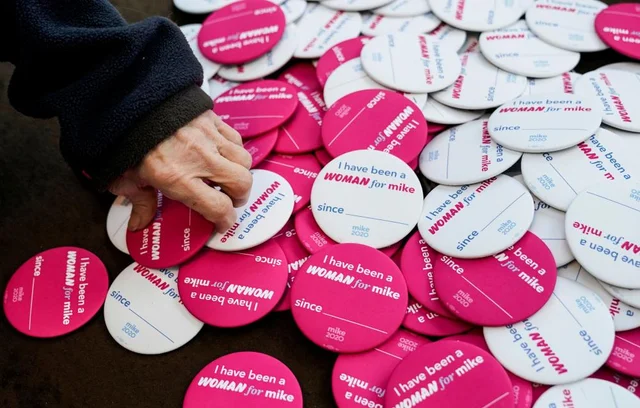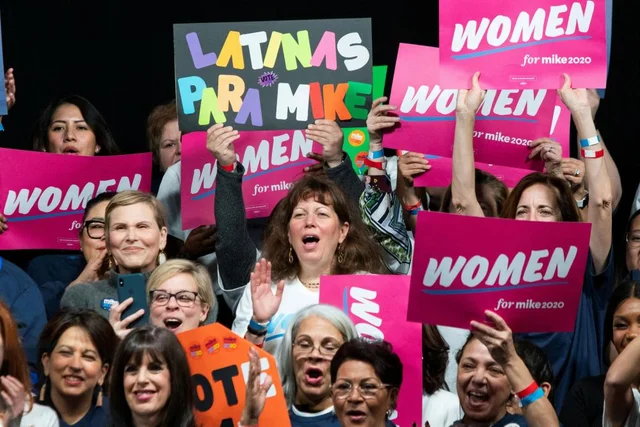
Billionaire Mike Bloomberg has launched one of the most audacious campaigns for the presidency in modern America: pouring almost half a billion dollars of his vast fortune into creating the most expensive nomination bid in US history.
But as Bloomberg has toured the country seeking to be the Democratic pick to fight Donald Trump – and his ads have swamped the air waves and social media – the former New York city mayor’s record on his behavior towards women, and women’s issues, has come under intense scrutiny.
The picture that has emerged is an ugly one, especially in the era of #MeToo and in a Democratic party whose base is rapidly diversifying and where women’s rights are a core issue. From lewd comments in the work place, to sexual harassment, to vetoing women’s rights legislation, Bloomberg’s record could be a huge drag on his campaign – no matter how much money he spends.
Michael Bloomberg has dismissed scrutiny of his past treatment of women saying those who’ve stepped forward with allegations of workplace harassment simply “didn’t like a joke I told.”
But records show that concerns surrounding his comments and behavior towards women run much deeper than jokes.
For years he has battled claims that he’s called women “fat broads” and “horse-faced lesbians,” allegedly announcing within an employee’s earshot that he would like to “do that piece of meat”, according to court records and other documents. (Bloomberg has denied ever saying the word “meat”.)
An aide recalled that Bloomberg often remarked “nice tits” upon seeing attractive women. In 1990 his employees put together a novelty book of quotes attributed to him, including such lines as “If women wanted to be appreciated for their brains, they’d go to the library instead of to Bloomingdale’s” and “I know for a fact that any self-respecting woman who walks past a construction site and doesn’t get a whistle will turn around and walk past again and again until she does get one.”
Elsewhere in the book, he says of the computer terminal responsible for his fortune, “It will do everything, including give you [oral sex]. I guess that puts a lot of you girls out of business.”
Bloomberg’s spokesman Stu Loeser has said of quotes attributed to him in the book: “Mike simply did not say the things somebody wrote in this gag gift, which has been circulating for 30 years and has been quoted in every previous election Mike has been in.” Loeser added that, all the same, “Mike openly admits that his words have not always aligned with his values and the way he has led his life and some of what he has said is disrespectful and wrong.”
But in his memoir, Bloomberg by Bloomberg, Bloomberg wrote that he “traveled with a big expense account, I had a girlfriend in every city”. The original version of the book published in 1997 also said that a reason his marriage fell apart was because “I like to go out and party,” according to news reports from the time. When the book was reissued ahead of the 2020 presidential election, that line was altered.
In a 1996 interview with the Guardian, he described his single bachelor life in New York as being a “wet dream”. And in a radio interview from 2003, he talked about how he would “really want to have” Jennifer Lopez, a remark he later explained away as wanting to “have dinner” with her. Meanwhile, he’s been accused in court records of telling employees “You must be a great fuck” and “I would like nothing more in life than to have Sharon Stone sit on my face.”
Such comments are demeaning to women, but at a time when the culture is undergoing a revolution in how it views sexual misconduct, Bloomberg’s past comments downplaying the seriousness of sexual assault may be even more worrisome.
During his first mayoral race in 2001, Bloomberg referred to domestic violence and sexual abuse as “quality-of-life” crimes, while speaking before Safe Horizon, an organization fighting domestic violence.
“In the last eight years, crime has come down dramatically, particularly with a lot of the quality-of-life crimes,” Bloomberg said during his speech. “If you think about domestic violence and sexual abuse as a quality-of-life crime, you realize just how much more has to be done. A battered woman – that’s a quality-of-life crime. Abuse of a child – that’s a quality-of-life crime.”

It isn’t just such talk that has people concerned. As mayor of New York in 2003, Bloomberg vetoed legislation requiring emergency contraceptives be available to rape victims in ERs. The New York city council later overrode Bloomberg’s veto, and that same year, New York state went on to mandate hospitals offer the drug to rape victims. (At the time he was a Republican. But as a Democrat, his campaign has noted, Bloomberg has supported abortion rights, donating millions to Planned Parenthood and other women’s rights organizations.)
More recently, Bloomberg has questioned allegations against disgraced TV anchor Charlie Rose. “The stuff I read about is disgraceful – I don’t know how true all of it is,” Bloomberg said in an interview of Rose, whose show ran on Bloomberg TV, part of the media company Bloomberg owns. Bloomberg also said the public should “let the court system decide” if someone charged of misconduct is guilty. “You know, is it true?” said Bloomberg of the accusations against Rose. “You look at people that say it is, but we have a system where you have – presumption of innocence is the basis of it.”
Such sympathies could put him at odds with the growing emphasis on the importance of believing women’s stories, an emphasis embraced by the Democratic party in the wake of #MeToo and following the high-profile trail of convicted rapist and movie producer Harvey Weinstein.
That Bloomberg is out of step with the Democratic party on these issues has been on full display in recent presidential debates, when senator Elizabeth Warren and other candidates have attacked him for his record on women and his refusal to issue a blanket-release of any and all women who’ve signed nondisclosure agreements with Bloomberg and Bloomberg LP.
It’s something Warren has personal experience with. At Tuesday’s debate in South Carolina, Warren spoke of how when she was a pregnant teacher at the age of 21, she lost her job after superiors discovered she was pregnant, adding: “At least I didn’t have a boss who said to me, ‘Kill it,’ the way that Mayor Bloomberg is alleged to have said.”
Warren was referencing allegations brought forward by Sekiko Sakai Garrison, who alleged in a 1998 lawsuit that while she was working for Bloomberg in the mid-1990s and told him she was pregnant, he told her to “kill it,” a comment she interpreted as meaning she should terminate her pregnancy if she wanted to keep her job.
Bloomberg denied the allegation at the debate on Tuesday, as he has previously.
But Bonnie Josephs, Garrison’s initial lawyer on the case – who hasn’t spoken to the press since Bloomberg first ran for mayor of New York in 2001 – said she’s speaking up now because her former clients’ non-disclosure agreement does not apply to her and she thinks it’s important the public knows what she knows about Bloomberg.

“She told me the story and I still believe her, and now I have even more reason to believe it,” said Josephs, referencing an investigative report from the Washington Post this month, in which another former Bloomberg employee who was present at the time of the encounter confirmed Garrison’s account.
That should meet even Bloomberg’s high standard for burden of proof.
That’s according to his deposition in a lawsuit waged against Bloomberg LP in the 1990s in which an employee alleged she was drugged and raped by her supervisor while working at Bloomberg’s company. When asked what would constitute “satisfactory proof” that one of his employees had raped another, Bloomberg replied: “I guess an unimpeachable third-party witness.”
When the lawyer then asked, incredulously, when a third-party witness might be expected to be present for a rape, Bloomberg said. “There are times when three people are together,” according to a deposition published in full by the Village Voice in 2001. Bloomberg added that if only two people were present, it would be impossible to say who’s being truthful and that “all we can do is provide separate working environments for the two”.
In a statement Bloomberg’s spokesman, while not disputing the accuracy of the statement, emphasized that Bloomberg “said it during a contentious deposition and this does not reflect what he believes”.
Now amid mounting pressure around his former employees’ NDAs, Bloomberg has offered to release certain people willing to get in touch with the company, adding that after an internal review, his team had found only three women to whom it would apply: people with non-disclosure agreements related to things he said personally.
He also announced his companies will no longer use NDAs in settlement agreements reached with employees who complain about harassment going forward.
But with nearly 40 sex discrimination and sexual harassment lawsuits out against him and his organizations over the past several decades, including three cases which remain active, many feel Bloomberg’s statement regarding existing NDAs is not enough.
Among them is Hassan Zavareei, a DC class-action attorney who’s familiar with Trump’s non-disclosure agreements and called Bloomberg’s release “ridiculous” since it essentially requires victims to go to him and ask for permission to talk, not even necessarily knowing if they’re one of the chosen three.
“He says those are the only people who’ve alleged misconduct by him personally,” Zavareei continued of the mysterious unnamed three, but there’s no way the public might actually verify that independently.
“What Warren was asking was for him to sign a blanket release, which he hasn’t done,” Zavareei said.
He also feels it’s problematic to release only people who have personally accused him, when so many complaints regard a broader corporate culture at his company. “That’s a huge problem because most of those allegations allege that there was a corporate problem of sexism and harassment,” Zavareei said. “That’s a gaping hole.”
Josephs agrees, and says it’s a “false distinction” that Bloomberg is trying to draw between people who have NDAs personally and people who have NDAs with Bloomberg LP, arguing that if you are the boss of a business you have a responsibility for what goes on in your shop.
“There are a good number of cases that were settled with non-disclosure agreements, not just the three he wants to talk about,” Josephs said. “He’s willing to pay sizable money to someone not to talk, so that must mean there’s a sizable problem.”
*Story by The Guardian